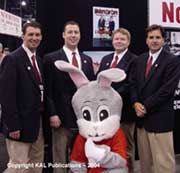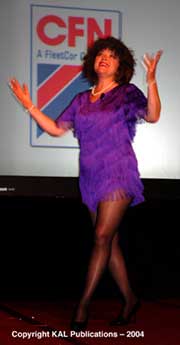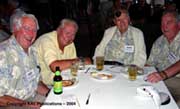
International Carwash Association Car Care World Expo

Commercial Fueling Network Membership Meeting

Northern California Petroleum Industry Golf and Tennis
Tournament
Want to see the photos that didn't make the issue? Check out
the Cutting Room
Floor.
EPA Wants More Underground Storage Tank Inspections
Ethanol Separates From Gasoline at Davis Arco
Hawaii Cigarette Taxes Increase
New Formulation Set for Off-Road Diesel
Petro Stopping Centers Adds Wi-Fi
WASHINGTON, D.C. — The U.S. Environmental Protection Agency has asked for an increase in underground storage tank inspections in order to "improve operational compliance."
In addition to increasing the number and frequency of UST inspections, the EPA is asking for better training of UST inspectors and site cleanup managers at both the federal and state levels.
EPA officials said they were making this recommendation after they discovered that properly maintained tanks were involved in fewer product releases — a conclusion that will come as no surprise to anyone, really. They also concluded that new leaks were generally due to faulty equipment, improper installation, and/or lack of proper operation and maintenance.
DAVIS, CA. — The new Arco station here, had some unexpected expenses after it opened its doors in mid-July. Drivers who filled up at the station within its first eight hours of operation discovered that they had filled their tanks with pure ethanol.
After 22 customers reported engine troubles, Todd Juchau and Blaine Juchau, co-owners of the Sun Mart Arco, shut down the station and examined the fuel. Preliminary reports found that the ethanol had separated from the gasoline in the station's USTs and drivers were pumping pure ethanol into their vehicles.
Yolo County Weights and Measures, which has jurisdiction over the station, is investigating the cause of the ethanol separation and believes it is due to the introduction of water into the fuel.
According to John Young, deputy agricultural commissioner for Weights and Measures, the water may have been introduced at the wholesaler when the ethanol was blended, in transit to the station in the truck, or at the station's UST.
The fuel had additional time to separate at the station because the opening of the Arco was delayed for three weeks while the station's leak monitoring system was tested.
The Arco station is reimbursing its customers for the costs of towing the vehicles as well as flushing out their fuel systems and replacing their fuel filters.
Arco officials said they examined the gasoline at the station several days later and said that it met fuel sale standards. However, the re-opening of the station was delayed because the Division of Measurement Standards in Sacramento wanted to test the fuel from the station. After taking 72 samples of fuels — one fuel from each nozzle at the station — the government agency then closed for the weekend, delaying the reopening of the Arco several additional days.
The am/pm convenience store at the station, located at Mace Boulevard and Second Street, remained open while the fuel system was being examined.
HONOLULU, HI. — Cigarette taxes in Hawaii have increased to $1.40 per pack, an increase of ten cents per pack, effective as of June 30.
Local retailers are concerned that the increase — as Hawaii now has the sixth highest taxes on cigarettes — will cause them to lose sales to internet vendors. Native American tribes are reportedly sending cigarettes purchased on-line to customers in Hawaii at a savings of almost $20 per carton.
Cigarette demand is high in Hawaii. The state's Department of Health reported that approximately one adult of every five Hawaiian residents smokes, translating to $70 million in taxes for the state last year.
Because the state does not want to lose its revenue to internet sales, the Hawaii Attorney General is proposing legislation to monitor personal internet tobacco purchases, making sure that no one buys and resells non-taxed cigarettes in the state.
Retailers are in favor of the legislation, stating it is a first step towards leveling the playing field in terms of cigarette sales.
WASHINGTON, D.C. — New regulations for the formulation of diesel fuel and the use of diesel-powered equipment and off-road machinery have been issue by the U.S. Environmental Protection Agency.
The EPA regulation will require refiners to remove virtually all of the sulfur from off-road diesel by 2012. Refiners will be required to cut sulfur levels in off-road diesel to 500 parts per million by 2007 and 15 parts per million by 2012.
The cleaner fuel would be mandated for use in all construction, farming, and off-road uses. The EPA predicts this, combined with mandatory engine replacements or upgrades, will result in an emissions reduction of over 90%.
The government agency predicts the cost of reformulating the off-road diesel to be approximately $40.5 million.
EL PASO, TX. — Petro Stopping Centers has announced that they will add Wi-Fi to all of their truck stop locations.
Petro Stopping is providing the wireless internet connection in conjunction with provider Truckstop.net. The system will allow customers at the Petro Stopping Centers to access the internet via their laptop computers, purchasing service on an hourly, daily, monthly, or annual basis.
Petro Stopping will market the service primarily to their professional truck driver customers although the service will be available to anyone on a Petro Stopping facility.
"We have gone to great lengths to make sure our signal is fast and strong from all parts of our parking lots," said Richard Tisdale, CIO of Petro Stopping.
Petro Stopping Centers operates 60 locations across the United States.
Originally published in the August 2004 issue of O&A Marketing News.
Copyright 2004 by KAL Publications Inc.
Serving the 13 Western States, the World's Largest Gasoline, Oil, Fuel, TBA and Automotive Service Market